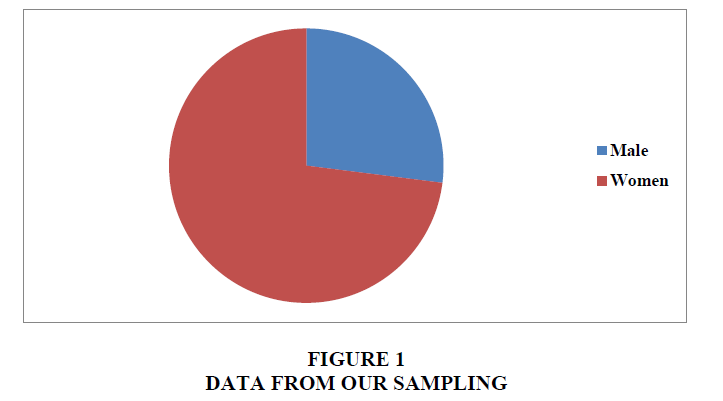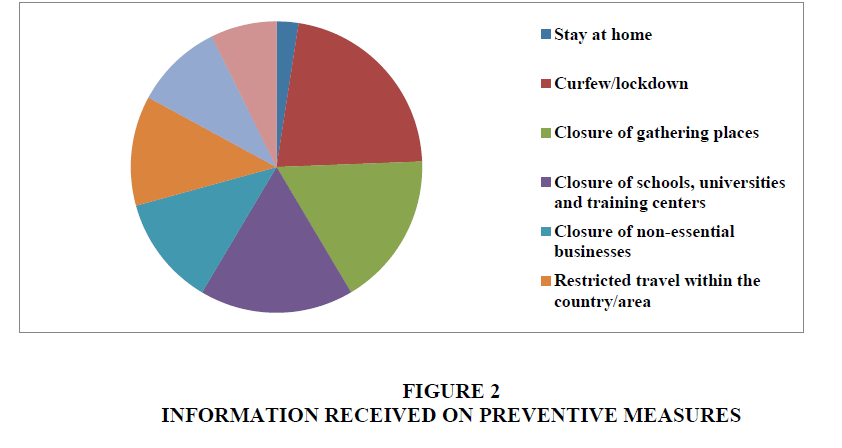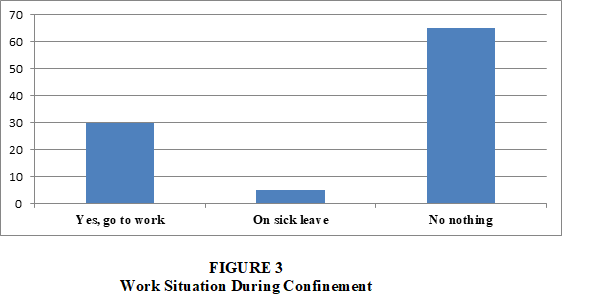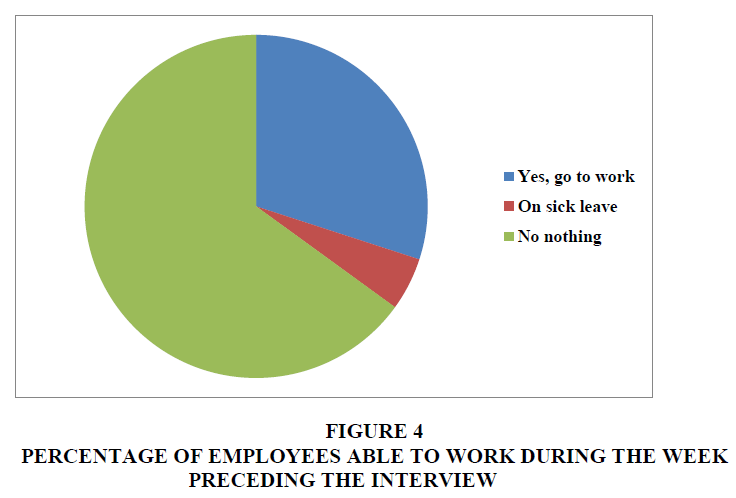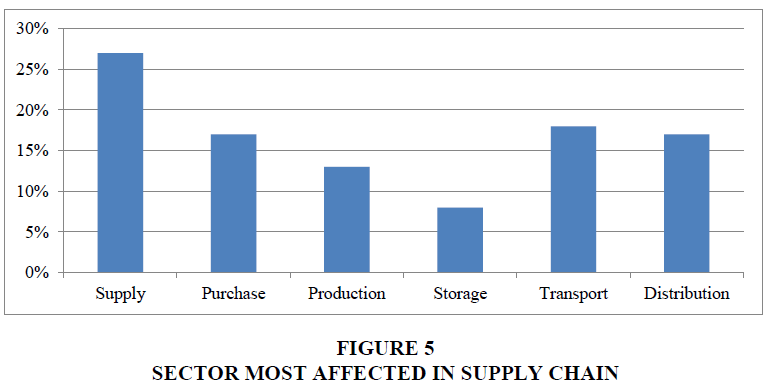Research Article: 2023 Vol: 26 Issue: 5
The Psychological and Socio-Economic impact of COVID-19 on the Tunisian population
Elleuch Fadoi, Sfax University
Semi Boudabbous, Sfax University
Citation Information: Fadoi, F., & Boudabbous, S. (2023). The psychological and socio-economic impact of covid-19 on the tunisian population. Journal of Management Information and Decision Sciences, 26 (5),1-10.
Abstract
Objective : We have studied the psychological and Eco-Social impact of the spread of the Coronavirus on the Tunisian family. So, Tunisia experienced, during the year 2021, a strong socio-economic transition impacted by the coronavirus pandemic Coronavirus. Indeed, from the beginning of the year, the situation of institutional blockage did not make it possible to face the various economic challenges, social and health issues faced by Tunisia.
Methods : We are studying a questionnaire posted on social networks assessing the initial impact of the spread of the Coronavirus pandemic and its consequences.
Results : We collected a questionnaire completed by parents. Both parents and children were impacted when the global Coronavirus pandemic began to spread in Tunisia. A psychological intervention is essential, in order to help them get out of this crisis, being the least impacted possible.
Conclusion: This situation was accompanied by a sharp rise in protests and social disputes which caused the slowing down or even the cessation of phosphate production in the Gafsa mining basin or oil extraction in the south, which had an immediate impact on the country's finances and caused the loss of certain markets.
Keywords
Coronavirus, Psychological- Impact, Socio-Economic Impact, COVID-19 Crisis.
Introduction
Throughout history, health crises have claimed the lives of many people and have also had a strong impact on our lifestyles, economy and industry, among others. The COVID-19 epidemic was declared a public health emergency of international concern in January 2020 by the World Health Organization, then a pandemic in March 2020, since its appearance in Hubei in China in 2019. The first effects of this health crisis has been felt in Tunisia since March 2020, as well as the weaknesses in logistics, particularly in the management of mask stocks and screening tests (Xie et al., 2020).
Africa, and specifically Tunisia, has not escaped this situation and as a result, the Tunisian government has taken several anticipatory measures in phase to prevent the progression of the pandemic within the nation (Romano, 2020; Ruiz Estrada et al., 2020).
The impact on production is also very important. Several countries around the world have been facing a health crisis for several weeks, causing enormous damage to the population, especially in Tunisia where the coronavirus is developing with frustrating frequency in many of its territories. The spread of this virus is impacting a multitude of strategic areas of activity in the kingdom, in particular the logistics and transport sector. Knowing that this sector is considered one of the most vital niches of the Tunisian economy, this phenomenon leaves a crippling imprint on all the links in the chain, both for transport and for logistics functions (Otmani et al., 2020; Luo & Tsang, 2020; Hadrya et al., 2020).
Austerity measures are further exacerbating the serious human consequences of an economic crisis characterized by record unemployment. They violate all human rights and disproportionately affect many vulnerable social groups. Poverty is deepening, especially among children, and is likely to have long-lasting effects. The crisis is also altering the capacity of the State and local authorities to respect, protect and consolidate the various human rights, which are increasingly weakened in various sectors.
Indeed, the pandemic has aggravated inequalities, discrimination and violence and put vulnerable people in great daily difficulty. All the civil society stakeholders we met said they had encountered coordination and orientation difficulties, which made everyone's work more difficult with a shared feeling of isolation and lack of networking on the subject.
ground. The Covid-19 pandemic has not only been a health crisis but also a social and economic crisis. The difficulties encountered during the period of covid-19 may be encountered in other periods of crisis, hence the possibility of generalizing the recommendations of this document to these situations. The pandemic crisis that quickly turned into a human rights crisis.
Coronavirus Art Study
Several countries around the world have been facing a health crisis for the past three years, causing enormous damage to the population, particularly in Tunisia where the Covid-19 is developing with frustrating frequency in many of its territories (Amadeo, 2020).
The spread of this virus is impacting many areas of strategic activity in the kingdom, in particular the logistics and transport sector. Knowing that this sector is considered one of the most vital niches of the Tunisian economy, this phenomenon leaves a crippling imprint on all the links in the chain, both for transport and for logistics functions (Bofinger et al., 2020).
The corona-virus (COVID-19) pandemic has created cost-effective health care in major metropolitan areas in the United States, and is expected to drive unemployment to a level not seen since the Great Depression. In the United States, fears of the COVID-19 outbreak began as we watched Italy's health care system grapple with a massive influx of patients. As a result, the US stock market recorded its largest point drop in history on Monday, March 9, 2020 (Gates, 2020).
In a highly connected and integrated world, the impacts of disease beyond mortality (those who die) and morbidity (those unable to work for a while) have become apparent since the outbreak. Amid the Chinese slowdown with production disruptions, the functioning of global supply chains has been disrupted. Companies across the globe, large and small, dependent on inputs from China have begun to experience production contractions. Transport being limited and even restricted between countries has further slowed down the global economy and their business. More importantly, a degree of panic among consumers and businesses has distorted normal consumer habits and created market anomalies. Global financial markets were also sensitive to changes and global stock indices plunged (Queiroz et al., 2022).
According to He et al.(2021) who attempt to interpret the possible effects of the current state of the virus on the economy. With this research, it has been attempted to come out as the first study to reveal the relationship between Coronavirus and stock markets with empirical results using time series analysis and this reveals the original side of the work (Sarkis, 2020).
The Coronavirus outbreak has proven the centrality of human resources in economic operations. It is imperative in this case to develop assessment frameworks that will take into account the interactions between states, countries and regions that provide timely approximations, with appropriate disclaimers on accuracy, for making decisions. emergency. In order to understand the negative effect of Coronavirus on the economy, we summarize it on some aspects of the global economy, focusing on one of the primary sectors which includes industries involved in the extraction of raw materials, secondary sectors involved in the production of finished products and tertiary sectors, including all service industries (Huckins et al., 2020).
The COVID-19 outbreak has proven the centrality of human resources in economic operations. It is imperative in this case to develop assessment frameworks that will take into account the interactions between states, countries and regions that provide timely approximations, with appropriate disclaimers on accuracy, for taking emergency decisions. In addition, there is a need to explore other alternative approaches to assess the potential risks posed by the spread of epidemics and to develop risk management strategies to protect against the impact of pandemics. These strategies include establishing more systematic protocols and building a case database for disease surveillance putting in place emergency response plans at local and national levels and implementing cost-effective measures (e.g. hospital quarantines, use of antiviral stockpiles) learned from past experience (Lai et al., 2020).
The COVID-19 crisis challenges companies on their ability to anticipate new risks, in particular health hazards, in the definition of their Supply Chain strategy. The question also arises in terms of the resilience and ability of their supply chain to sustain or recover quickly in times of crisis. Finally, the overall performance of the company depends on the reliability and regularity of the supply chain, the challenge being to build new logistics strategies by providing them with the capacity for responsiveness and efficiency in a context characterized by uncertainty (Sun et al., 2020).
The optimization of prevention, the creation of specific treatment, the promotion of health education and specific hygiene rules are target solutions to improve the economic state to confront against the Coronavirus.
In this research work, we will present the results of an empirical study carried out with the aim of measuring the impact of the psychological and socio-economic pandemic of COVID-19 on the Tunisian population. After the presentation of the research methodology adopted and the working hypotheses adopted (Ather et al., 2020).
Collection of Data
First Phase: Information collection
This phase used a sampling strategy carried out on line. Respondents were targeted using ads on Facebook. The questionnaire developed for the survey was structured in two parts, which received response rates:
• 37% of individuals answered the questions in the first part, relating to the psychological impact of Coronavirus on respondents;
• And the rest answered the questions of the second part, relating to the socio-economic impact of the COVID-19 crisis on the Tunisian population.
• Once validated, the ads on Facebook could be viewed by users meeting the characteristics of the population of interest for the duration of the data collection.
• Each announcement contained the link to the questionnaire and an explanation of the purpose of the study. By clicking on the advertisement, respondents were directed to the platform which contained additional information on the objectives and nature of the survey, confidentiality guarantees and modalities of participation. Filter questions on nationality, employment status and country of residence were asked at the beginning of the questionnaire. Respondents who reached the end of the questionnaire were asked to share their email address and provide their consent to participate in the second phase of the survey.
• The use of an ads approach by Facebook has enabled to achieve ambitious goals while respecting logistical (dictated by the Coronavirus pandemic) and budgetary constraints. No other traditional data collection method would have made it possible to reach such a large portion of the population of interest in its diversity, with such a vast geographical extension in such a short time, and without having reliable information on its distribution in target countries.
We Sought the following data through the Questionnaire
• Socio-demographic characteristics of each individual;
• Existence of cases of Coronavirus disease or not?
• Existence of a COVID-19 risk situation: contaminated or confined person;
• Stress levels caused by the Coronavirus;
• Method of life in the Tunisian family to confront the risk of increasing the rate of the number of sick cases in Covid-19 ;
• Occurrence of a change in family habits: following the containment and the spread of the Coronavirus pandemic in Tunisia regarding.
Second Phase: Result and Interpretation
Psychiatric Effect
From our sampling, we notice that age had no influence on the different scores. On the other hand, women expressed more anxiety symptoms. Participants with a psychiatric history of depression or anxiety disorder had significantly higher scores for anxiety symptoms and depressive symptoms. Regarding work in the Coronavirus departments, no significant difference was found between the two groups in terms of scores on the psychometric scales.
In addition, significant correlations were found between the profession and the scores: the two psychometric scores of workers in the health field were significantly higher and of more severe severity compared to other professionals, in particular the one evaluating anxiety symptoms and that evaluating depressive symptoms. Dentists had significantly higher psychometric scores for depressive symptoms.
By univariate analysis, we established that having a psychiatric history of depressive disorder or anxiety disorder was significantly associated with the development of anxiety symptoms of moderate to severe intensity. Professionals with this factor also had a greater risk of developing moderate to severe depressive symptoms (see Figure 1).
Thus, several areas of concern for the situation of women in a situation of Coronavirus emerge including:
• Violence against women: On a situation already alarming rate of gender-based violence have added the Coronavirus crisis and containment
• Women experience more violence in the absence of coping mechanisms suitable protection
• The feminization of the health sector with its corollary the need to take specific measures support and protection
• Difficulties in accessing justice and the need to protecting women
• Access to sexual and reproductive health services in decline in recent years as evidenced by the variousindicators is a challenge that is difficult to achieve
• The concealment of female leadership in the spheres of decision-making impacting the political future of women and removing any gender dimension from the decisions taken.
Socio-Economic Effect
Impact of Containment on Income
The socio-economic impact on women is also more pronounced given that they are already the poorest and that many of them are part of the informal sector and precarious (housekeepers, informal trade, craftswoman undeclared) and that the government has not taken measures specific for women in the allocation of aid social. The highlighting of female leadership has become essential in the scientific, medical and academic committees, but the low previous representation of women in the decision-making bodies has largely marked the management of the COVID-19 crisis.
The proposed methodology aims to measure the immediate effects of the Covid-19 pandemic generated by the containment of the population, the drop in economic activity and the drop in demand for goods or services, which are obviously the most harmful, on the well-being of households.
For this we make a simulation over a period of 21 months after the start of COVID-19 and we study these three different scenarios:
• Scenario 1: Baseline end of 2020 with COVID-19 ;
• Scenario 2: 2 months of confinement of certain sectors + price increase en 2021 ;
• Scenario 3: a few months of confinement in certain sectors + 1.5 times the price increase of scenario 2 for the month of August in 2021
In scenario 3, extreme poverty could almost double from 2.7% to 5.9%, while the poverty rate would increase from 13.9% to 22.2%, an increase in absolute terms. Even in scenario 2, let according to our sampling, we notice an increase of nearly 7 percentage points in the incidence of poverty (from 13.9% to 20.5%). Remember that this modeling only takes into account the direct effects of confinement on the income of confined workers. It therefore ignores the possible secondary effects due to the decline in economic activity, investments and transfers by Tunisians abroad in the medium and long term. These forecasts should therefore be seen as conservative estimates of the expected final real impact.
According to our estimates, the crisis will have a greater impact on the poorest workers, who are overrepresented in confined and informal sectors. This means that inequalities should increase as a result of the crisis, with a coefficient that would increase from 0.39 currently, to 0.43 in scenario 2, and 0.46 in scenario 3.
Finally, it should be noted that due to the strong correlation between household size and poverty in Tunisia, the crisis is likely to have a greater impact on children. Indeed, our projections show that child poverty could increase by 5 percentage points in scenario 2, and by 11 percentage points (from 19.5% to 29.7%) following the crisis in the pessimistic scenario 3.
The result is that confinement will have a proportionally greater impact on the poorest households. In the second scenario, the average loss of income (proxied by consumption) would be greater than 11% almost in the first decile, compared to the reference scenario 1, against less than 6% for the richest decile. In the third pessimistic scenario, the difference would be even greater: from 15% to 20% for the poorest decile against 7% for the richest decile.
Knowledge of Preventive Measures and Social Behaviors
Almost all respondents received information on social distancing and self-isolation as a preventive measure against the Coronavirus. The vast majority of respondents have adopted barrier gestures and basic health measures on a daily basis.
It should also be noted that around a third of the respondents declared that they had stored everyday consumer goods as a precaution. Self-medication behaviors and the use of traditional medicine against the Coronavirus seem to be limited within the population (See Figure 2).
Access to Goods and Services and Food Security
The health crisis has had repercussions on the availability of certain products, mainly flour and semolina and, to a lesser extent, certain sanitary products (hydroalcoholic gels, bibs, etc.). Households located in rural areas were more affected by the shortage of these products. However, other foodstuffs (bread, pasta, couscous, vegetables, fruit, etc.), cleaning products and even energy products were widely available. A consumption questionnaire analysis shows that shortages of some basic food items have affected relatively equally across all segments of the population. On the other hand, the difficulty of access to the productsincreases inversely with the standard of living.
Access to Health
Almost 39% of respondents who needed medical assistance were unable to access it. This rate rises to almost 57% for the poorest households. The lack of access to care is mainly due to the limitation of travel due to confinement, but also to the difficulty of finding available medical personnel.
Economic Activity
Compared to the period before total confinement, 59% of those questioned had to stop working when they were active before; only 27% were able to continue their activity. Among those declaring a work stoppage, more than 77% mention reasons directly or indirectly related to the Coronavirus. It should also be noted that the cessation of activity affected all classes of the population in a relatively homogeneous manner (See Figure 3).
Salaried work
The work stoppage affected almost two-thirds of the employees surveyed. Teleworking only concerned one out of ten employees among those who were able to continue their professional activity. This ability to diversify the way of working (by changing working from home) increases with the standard of living to reach nearly one in three employees (See Figure 4).
Crisis Management
Although the full impact of COVID-19 is still unknown, many organizations are being impacted by declining sales and reduced consumer demand, supply chain disruptions and transportation restrictions. These issues will have an adverse effect on global markets, with escalating risk likely to affect those not yet directly impacted by COVID-19. These companies need to consider their pandemic preparedness measures and be proactive and prepared. This part of paper focuses on identifying the management crisis (See Figure 5).
Logistics
The impact of COVID-19 on the industry is also very significant. Many countries around the world have since been facing a health crisis, causing enormous damage to the population, especially in Tunisia where the corona virus is developing with frustrating frequency. Very quickly, logistics appeared to everyone as an essential pillar in the management of this pandemic. For this, we have summarized in Figure 5 the sectors most affected by COVID-19 in the Tunisian supply chain.The consequences of Coronavirus have proven to be heavy on the national economy. The results of our study show that 49% of companies experienced a drop in their activity after confinement, while 37% of them considered this drop to be moderate or severe. On the contrary, only (14%) of companies recorded an increase in activity. In our sample, these companies belong to sectors that have benefited from the health crisis and containment of the population (pharmaceutical industry, medical and mass distribution).
Conclusion
These results show that in the future, it would be extremely important to ensure that economic growth benefits the poor and is therefore inclusive. It may be important to consider fostering employment as well as alternative livelihood mechanisms in regions and areas that have been left behind. The additional shock introduced by the Coronavirus is expected to increase the poverty rate and inequalities in Tunisia. This clustering of the population of the poverty line has important consequences in the face of a high risk that the country faces in the future. Many households could fall back into poverty due to environmental or economic shocks. Therefore, mechanisms to protect this large vulnerable subgroup should be a top priority.
References
Amadeo, K. (2020). How does the 2020 stock market crash compare with others?,“. The Balance.
Ather, A., Patel, B., Ruparel, N. B., Diogenes, A., & Hargreaves, K. M. (2020). Coronavirus disease 19 (COVID-19): implications for clinical dental care. Journal of endodontics, 46(5), 584-595.
Indexed at, Google Scholar, Cross Ref
Bofinger, P., Dullien, S., Felbermayr, G., Fuest, C., Hüther, M., Südekum, J., & Weder di Mauro, B. (2020). Economic implications of the corona crisis and economic policy measures. Wirtschaftsdienst, 100, 259-265.
Indexed at, Google Scholar, Cross Ref
Gates, B. (2020). Responding to Covid-19—a once-in-a-century pandemic?. New England Journal of Medicine, 382(18), 1677-1679.
Indexed at, Google Scholar, Cross Ref
Hadrya, F., Soulaymani, A., & El Hattimy, F. (2020). Space-time COVID-19 monitoring in Morocco. The Pan African Medical Journal, 35(Suppl 2).
Indexed at, Google Scholar, Cross Ref
He, W., Zhang, Z. J., & Li, W. (2021). Information technology solutions, challenges, and suggestions for tackling the COVID-19 pandemic. International Journal of Information Management, 57, 102287.
Huckins, J. F., DaSilva, A. W., Wang, W., Hedlund, E., Rogers, C., Nepal, S. K., ... & Campbell, A. T. (2020). Mental health and behavior of college students during the early phases of the COVID-19 pandemic: Longitudinal smartphone and ecological momentary assessment study. Journal of Medical Internet Research, 22(6), e20185.
Lai, J., Ma, S., Wang, Y., Cai, Z., Hu, J., Wei, N., ... & Hu, S. (2020). Factors associated with mental health outcomes among health care workers exposed to coronavirus disease 2019. JAMA Network Open, 3(3), e203976-e203976.
Indexed at, Google Scholar, Cross Ref
Luo, S., & Tsang, K. P. (2020). China and world output impact of the Hubei lockdown during the coronavirus outbreak. Contemporary Economic Policy, 38(4), 583-592.
Otmani, A., Benchrif, A., Tahri, M., Bounakhla, M., El Bouch, M., & Krombi, M. H. (2020). Impact of Covid-19 lockdown on PM10, SO2 and NO2 concentrations in Salé City (Morocco). Science of the Total Environment, 735, 139541.
Indexed at, Google Scholar, Cross Ref
Queiroz, M.M., Ivanov, D., Dolgui, A., & Fosso Wamba, S. (2022). Impacts of epidemic outbreaks on supply chains: mapping a research agenda amid the COVID-19 pandemic through a structured literature review. Annals of Operations Research, 319(1), 1159-1196.
Romano, F. (2020). An estimate of the economic impact of COVID-19 on Australia. Available at SSRN 3581382.
Indexed at, Google Scholar, Cross Ref
Ruiz Estrada, M. A., Park, D., Koutronas, E., Khan, A., & Tahir, M. (2020). The impact of infectious and contagious diseases and its impact on the economic performance: The case of Wuhan, China. (January 29, 2020).
Sarkis, J. (2020). Supply chain sustainability: learning from the COVID-19 pandemic. International Journal of Operations & Production Management, 41(1), 63-73.
Sun, N., Wei, L., Shi, S., Jiao, D., Song, R., Ma, L., ... & Wang, H. (2020). A qualitative study on the psychological experience of caregivers of COVID-19 patients. American Journal of Infection Control, 48(6), 592-598.
Xie, X., Xue, Q., Zhou, Y., Zhu, K., Liu, Q., Zhang, J., & Song, R. (2020). Mental health status among children in home confinement during the coronavirus disease 2019 outbreak in Hubei Province, China. JAMA Pediatrics, 174(9), 898-900.
Indexed at, Google Scholar, Cross Ref
Received: 17-Jun-2023, Manuscript No. JMIDS-23-13808; Editor assigned: 20-Jun-2023, Pre QC No. JMIDS-23-13808(PQ); Reviewed: 08-Jun-2023, QC No. JMIDS-23-13808; Revised: 10-Jun-2023, Manuscript No. JMIDS-23-13808(R); Published: 27-Jul-2023
